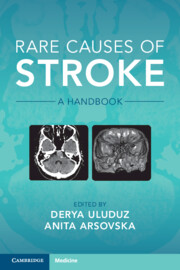Book contents
- Rare Causes of Stroke
- Rare Causes of Stroke
- Copyright page
- Contents
- Contributors
- Preface
- 1 Inflammatory Conditions
- 2 Infectious and Postinfectious Vasculitis
- 3 Hypercoagulable Causes of Stroke
- Chapter 3.1 Antiphospholipid Antibody Syndrome
- Chapter 3.2 Hyperhomocysteinemia
- Chapter 3.3 Hyperviscosity Syndrome
- Chapter 3.4 Disseminated Intravascular Coagulation and Moschkowitz Syndrome
- Chapter 3.5 Immunoglobulin A Vasculitis (Henoch–Schönlein Purpura)
- Chapter 3.6 Stroke Associated With Cancer
- 4 Drug-Related Stroke
- 5 Hereditary and Genetic Causes of Stroke
- 6 Rare Causes of Cardioembolism
- 7 Vasospastic Conditions and Other Vasculopathies
- 8 Other Non-inflammatory Vasculopathies
- 9 Venous Occlusive Conditions
- 10 Bone Disorders and Stroke
- Index
- References
Chapter 3.1 - Antiphospholipid Antibody Syndrome
from 3 - Hypercoagulable Causes of Stroke
Published online by Cambridge University Press: 06 October 2022
- Rare Causes of Stroke
- Rare Causes of Stroke
- Copyright page
- Contents
- Contributors
- Preface
- 1 Inflammatory Conditions
- 2 Infectious and Postinfectious Vasculitis
- 3 Hypercoagulable Causes of Stroke
- Chapter 3.1 Antiphospholipid Antibody Syndrome
- Chapter 3.2 Hyperhomocysteinemia
- Chapter 3.3 Hyperviscosity Syndrome
- Chapter 3.4 Disseminated Intravascular Coagulation and Moschkowitz Syndrome
- Chapter 3.5 Immunoglobulin A Vasculitis (Henoch–Schönlein Purpura)
- Chapter 3.6 Stroke Associated With Cancer
- 4 Drug-Related Stroke
- 5 Hereditary and Genetic Causes of Stroke
- 6 Rare Causes of Cardioembolism
- 7 Vasospastic Conditions and Other Vasculopathies
- 8 Other Non-inflammatory Vasculopathies
- 9 Venous Occlusive Conditions
- 10 Bone Disorders and Stroke
- Index
- References
Summary
Antiphospholipid antibody syndrome (APS) is a multisystem autoimmune disease characterized by venous or arterial thrombosis and/or pregnancy morbidity in the presence of persistent antiphosholipid antibodies (aPLs). Central nervous system is often affected and thrombotic or embolic ischaemic stroke (IS) is the most frequent complication. Intracranial stenosis or occlusion accounts for about 50% of APS patients, especially in the Middle cerebral artery territory (MCA). We report a case of a young woman with recurrent cerebral ischemic lesions and history of miscarriages. In 2015 a 43 years old woman was admitted to Emergency Department (ED) due to a left brachial weakness at wake-up from an ischemic fronto-parietal lesions and steno-occlusion of the proximal M1 segment of the right Middle Cerebral Artery (MCA). She had a history of arterial hypertension, migraine, previous transient ischemic attack (TIA) and was a tobacco smoker. Diagnostic workup showed high levels of aPLs. She was discharged with improved clinical conditions on antiplatelet and steroid therapy, but she had recurrent IS a month later and three years later. In the same period, she reported two miscarriages. Follow up lab tests confirmed high-titre of aPLs. Therefore, diagnosis of APS was validated. A direct oral anticoagulant was started. No recurrent events occurred over the next 2-year follow-up. Stroke is a common manifestation in APS. Diagnosis of APS is not easy. Prospective data on the therapeutic approach to APS patients with IS are scarce and recurrence rate of thrombotic events among APS patients are high, despite anticoagulation
Keywords
- Type
- Chapter
- Information
- Rare Causes of StrokeA Handbook, pp. 151 - 156Publisher: Cambridge University PressPrint publication year: 2022



